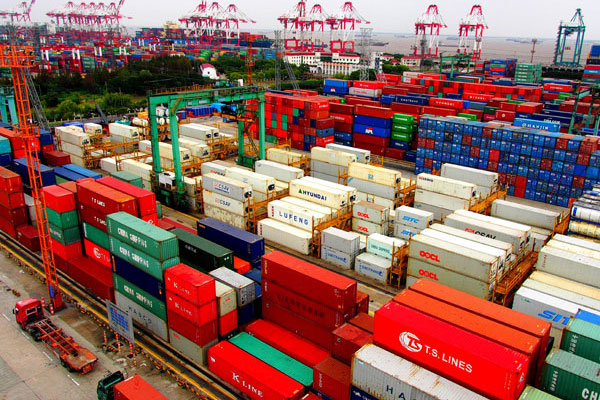

 |
| Containers pile up at Waigaoqiao Port in the Shanghai Free Trade Zone. [Photo/Xinhua] |
China's trade conditions remain "complex and rigorous" amid more global market uncertainties that have disrupted the trade performance so far this year.
This was spelled out in a guideline document released by the State Council on Monday.
The State Council stresses in the document that governments at all levels should improve efficiency in 14 areas.
These include optimizing tax refund policies for certain exports, enhancing export credit insurance, and offering more financial support to Chinese manufacturers.
Exports in yuan-denominated terms increased by 4.1 percent year-on-year and imports fell by 5.7 percent, according to the General Administration of Customs.
Lin Guijun, a professor of international trade at the University of International Business and Economics in Beijing, said, "In addition to weak global demand, other uncertainties, such as fluctuation of foreign currencies and policy adjustment in major economies, had an impact on global trade and China's foreign trade volume last month.
"China's goal to increase import volume over the next five years will stimulate service trade opportunities for developed countries, as the government is offering wider market access to global companies," Lin said.
The service trade refers to the sale and delivery of intangible products, such as tourism, financial services and telecommunications services.
The guideline states that other new measures, such as cross-border e-commerce, multimodel logistics services and the government procurement trade, will also help private companies to diversify their global sales channels to enhance their earning ability under the current global business situation.
The government will support high-end manufacturing industries to build after-sales stations or centers and training schools overseas to improve their brand influence.
China's four pilot free trade zones in developed coastal areas, including Shanghai and Guangdong, are spearheading structural reforms to make it easier to start businesses and grant foreign companies more access to the service sector.
Loosened capital controls and wider access to sectors that remain closed or restricted to foreign companies elsewhere triggered a surge in new business registrations and cross-border transactions in these zones between January and April.
Denis Depoux, deputy president of Roland Berger Strategy Consultants for Asia, said China's policymakers will be increasingly evaluating economic, environmental and operational efficiency, and upgrading manufacturing facilities toward more automated, digitally controlled and responsive factories.
 Beijing Style: ready for bare legs
Beijing Style: ready for bare legs Century-old station sees railyway evolution
Century-old station sees railyway evolution Amazing scenery of Xisha Islands
Amazing scenery of Xisha Islands Enthusiasts perform Kung Fu at Wudang Mountain
Enthusiasts perform Kung Fu at Wudang Mountain Stunning photos of China's fighter jets in drill
Stunning photos of China's fighter jets in drill Monk's mummified body to be made into a gold Buddha statue
Monk's mummified body to be made into a gold Buddha statue Asia's longest and highest suspension bridge to open to traffic
Asia's longest and highest suspension bridge to open to traffic China's first interactive robot looks like a beauty
China's first interactive robot looks like a beauty Vietnamese Su-30 fighters fly over Nanwei Island in South China Sea
Vietnamese Su-30 fighters fly over Nanwei Island in South China Sea Top 20 hottest women in the world in 2014
Top 20 hottest women in the world in 2014 Top 10 hardest languages to learn
Top 10 hardest languages to learn 10 Chinese female stars with most beautiful faces
10 Chinese female stars with most beautiful faces China’s Top 10 Unique Bridges, Highways and Roads
China’s Top 10 Unique Bridges, Highways and Roads Is Pyongyang’s no-first-use pledge new stance?
Is Pyongyang’s no-first-use pledge new stance?  Kilns stick to ancient way of making bricks despite rock-bottom demand
Kilns stick to ancient way of making bricks despite rock-bottom demand China scores back-to-back exports growth
China scores back-to-back exports growth Chinese women in intercultural marriages discuss the ups and downs of dealing with their husbands’ moms
Chinese women in intercultural marriages discuss the ups and downs of dealing with their husbands’ momsDay|Week